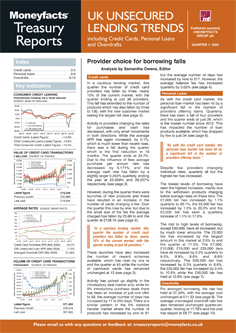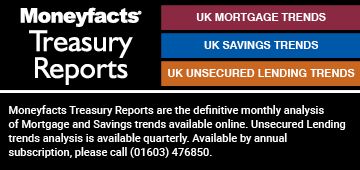Rachel Springall, Finance Expert at Moneyfacts, said:
“The choice of providers that offer a credit card or unsecured personal loan has contracted. Since the start of December 2023, three credit card providers withdrew from the market; Wave, smile and Cashplus. As a result, the number of providers fell to 36, standing at its lowest point since August 2020 (36). The number of providers offering unsecured loans fell by four over the past quarter to 26, the lowest count since July 2012 (26), as AA, Bank of Ireland UK, Post Office Money and RateSetter left the market. Due to a rise in borrowing costs over the past quarter, the average credit card APR and the rates charged on most unsecured personal loan tiers rose.
“The credit card market noted a rise to both the number of 0% introductory purchase deals and balance transfers and the interest-free terms in days for these deals, good news for customers looking for a new credit card to move their debts or spread the cost of new purchases. However, the upfront cost to transfer debts rose, as the average balance transfer fee hit 2.40%, up from 2.38% in December 2023. It is worth noting that there remain several cards with 0% balance transfer deals that do not charge a fee, so these are worth exploring by consumers who wish to avoid upfront costs when moving debts. However, the 0% terms on fee-free cards are shorter in length compared to the most generous interest-free terms, so borrowers will have less time to pay back their debts.
“Unsecured personal loans are useful for consumers who want a simple fixed repayment plan, but they are costing more in interest. With rates rising across all tiers below £50,000 over the past quarter, borrowers will need to compare deals carefully before they commit. Those who want some flexibility with their repayments may instead choose a credit card, but they do need to aim at paying off their debits before interest applies. It is wise for borrowers to check their credit score and fix any errors before applying for credit. Existing borrowers struggling to keep up with repayments must speak to their provider and consider seeking debt advice.”
Rachel Springall, Finance Expert at Moneyfacts, said:
“The choice of providers that offer a credit card or unsecured personal loan has contracted. Since the start of December 2023, three credit card providers withdrew from the market; Wave, smile and Cashplus. As a result, the number of providers fell to 36, standing at its lowest point since August 2020 (36). The number of providers offering unsecured loans fell by four over the past quarter to 26, the lowest count since July 2012 (26), as AA, Bank of Ireland UK, Post Office Money and RateSetter left the market. Due to a rise in borrowing costs over the past quarter, the average credit card APR and the rates charged on most unsecured personal loan tiers rose.
“The credit card market noted a rise to both the number of 0% introductory purchase deals and balance transfers and the interest-free terms in days for these deals, good news for customers looking for a new credit card to move their debts or spread the cost of new purchases. However, the upfront cost to transfer debts rose, as the average balance transfer fee hit 2.40%, up from 2.38% in December 2023. It is worth noting that there remain several cards with 0% balance transfer deals that do not charge a fee, so these are worth exploring by consumers who wish to avoid upfront costs when moving debts. However, the 0% terms on fee-free cards are shorter in length compared to the most generous interest-free terms, so borrowers will have less time to pay back their debts.
“Unsecured personal loans are useful for consumers who want a simple fixed repayment plan, but they are costing more in interest. With rates rising across all tiers below £50,000 over the past quarter, borrowers will need to compare deals carefully before they commit. Those who want some flexibility with their repayments may instead choose a credit card, but they do need to aim at paying off their debits before interest applies. It is wise for borrowers to check their credit score and fix any errors before applying for credit. Existing borrowers struggling to keep up with repayments must speak to their provider and consider seeking debt advice.”











